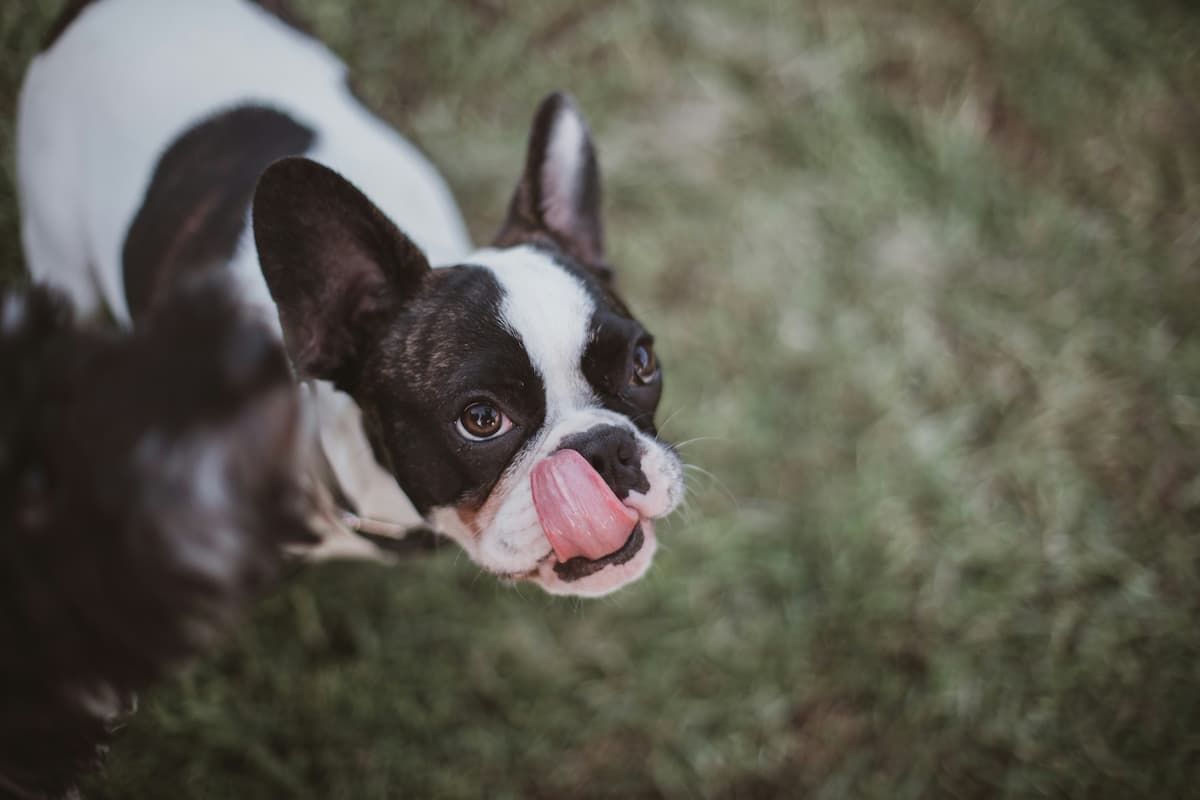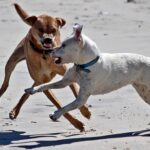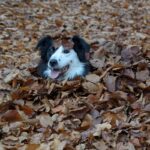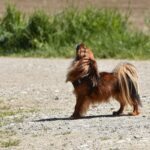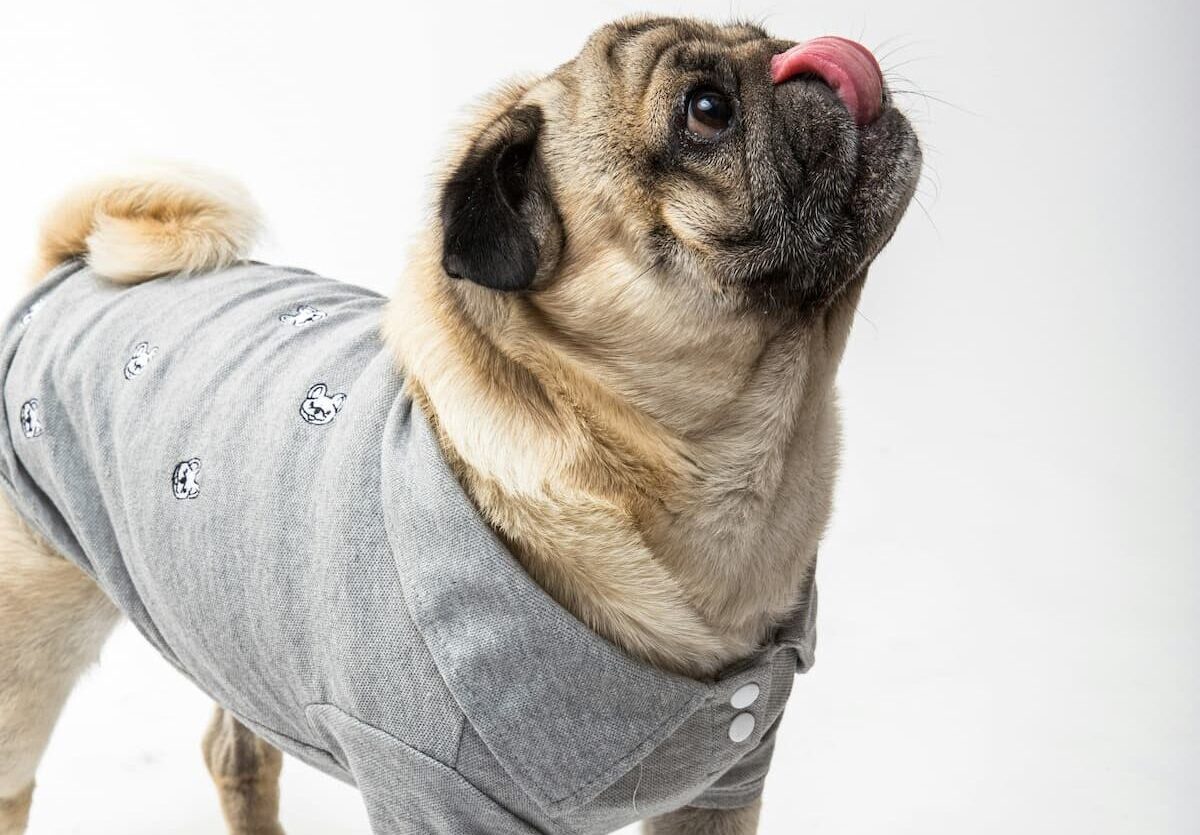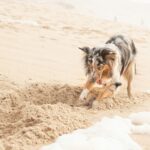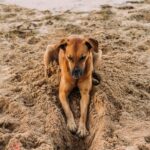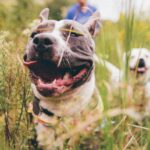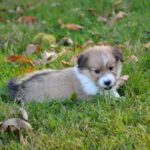Have you ever found yourself perplexed by your furry friend’s peculiar grooming habits?
As I sat on the couch, observing my dog’s peculiar behavior, I couldn’t help but question why dogs have a knack for licking their paws, only to follow it with an amusing face-wiping routine.
It’s a seemingly nonsensical ritual that both intrigues and bewilders pet owners worldwide.
Read on to uncover the fascinating reasons behind this behavior.
Why Do Dogs Lick Their Paws and Wipe Their Face?
Dogs are fascinating creatures, and one of their quirkiest behaviors is their tendency to lick their paws and then wipe their face.
While it may seem like a simple grooming habit, there are actually a few reasons why dogs engage in this behavior.
One possible explanation is that dogs lick their paws to clean them.
Just like humans, dogs can accumulate dirt, debris, or even small objects between their toes, which can be uncomfortable or even painful.
Licking their paws is their way of “washing” them, removing any foreign substances that may be causing irritation.
Afterward, they may wipe their face as a way of spreading their saliva, which acts as a natural disinfectant and can help keep their faces clean.
Another reason why dogs may lick their paws and then wipe their faces is due to allergies or skin irritations.
Just like humans, dogs can experience allergies to certain foods, plants, or environmental factors.
Licking their paws may provide temporary relief from the itchiness or discomfort caused by these allergies.
By wiping their faces afterward, they may be attempting to spread the relief-giving saliva onto other areas that may be affected by the irritation.
This behavior may also be an example of marking territory.
Dogs have scent glands on their paws, and by transferring these scents to their face, they are leaving their unique “signature” behind.
This behavior is a relic from their ancestors, who relied on scent marking to communicate with other pack members.
Another possible reason for this behavior is anxiety or stress.
Dogs, just like humans, can experience anxiety in various situations, such as when left alone or during thunderstorms.
When feeling anxious, dogs may resort to repetitive behaviors, including excessive paw licking and face wiping.
This repetitive behavior can act as a sort of self-soothing mechanism, helping them cope with their unease.
Furthermore, this behavior might also be a sign of pain or discomfort.
Dogs have a natural instinct to clean themselves, and if they are experiencing any discomfort or pain, they may focus on certain areas, such as their paws, and try to alleviate the discomfort by licking them.
The act of wiping their face afterward could be their attempt to clean away any potential irritants.
Tips to Help Manage and Reduce This Behavior
Dogs are adorable creatures, but sometimes their behaviors can leave us scratching our heads.
One peculiar behavior that many dog owners have noticed is when their furry friends lick their paws and then proceed to wipe their faces.
It may seem strange, but this behavior is actually quite common among dogs.
Here are some tips to ensure your pooch stays happy and healthy.
1. Keep those paws clean: One possible reason why dogs lick their paws is to clean them.
Just like humans, dogs can get dirt, debris, or even small objects stuck in their paws.
By licking them, they are instinctively trying to remove any discomfort or foreign objects.
Regularly inspecting and cleaning your dog’s paws can help reduce the need for them to constantly lick and wipe their faces.
2. Address any underlying issues: Excessive paw licking can also be a sign of an underlying issue, such as allergies or skin irritations.
These can cause discomfort and prompt your dog to engage in this behavior to alleviate the itchiness or pain.
If you notice persistent paw licking, it’s best to consult with a veterinarian to identify any potential allergies or skin conditions.
They can recommend appropriate treatments or dietary changes to help manage the problem.
3. Provide mental and physical stimulation: Dogs may also lick their paws and wipe their faces out of boredom or as a way to cope with anxiety or stress.
Ensuring your furry friend receives plenty of mental and physical stimulation can help redirect their attention and reduce this behavior.
Regular exercise, interactive toys, and engaging in training sessions or games can keep their minds occupied and help alleviate any pent-up energy or anxiety that may be causing the excessive paw licking.
Remember, each dog is unique, and what may work for one may not work for another.
It’s essential to observe your dog’s behavior closely and adapt the tips accordingly.
By understanding why dogs engage in this behavior and taking the necessary steps to manage and reduce it, you can help your furry friend lead a happier, more comfortable life.
When to Seek Veterinary Advice for Your Pup’s Paw Licking
While occasional licking is normal behavior, excessive or persistent paw licking can be a cause for concern.
So, when should you seek veterinary advice for your pup’s paw licking?
Here are some scenarios when it’s a good idea to reach out to a professional:
1. When the licking becomes excessive: If you notice your furry friend constantly licking their paws, to the point where it’s interfering with their daily activities or causing them discomfort, it may be time to consult with a veterinarian.
Excessive licking can be a sign of an underlying issue like allergies, irritation, or even an infection.
A vet can help identify the root cause and provide the appropriate treatment.
2. If there are visible signs of redness, swelling, or wounds: While some dogs may lick their paws as a self-soothing mechanism, if you notice any visible changes in their paw’s appearance, it’s best to seek veterinary advice.
Redness, swelling, or the presence of open wounds can indicate an infection, injury, or allergic reaction.
These conditions may require medical intervention to prevent further complications and alleviate your pup’s discomfort.
3. When the licking is accompanied by other symptoms: Pay attention to any other unusual behaviors or symptoms your dog may exhibit along with the excessive paw licking.
If you notice things like limping, changes in appetite, lethargy, or hair loss, it’s important to consult with a vet.
These additional symptoms could be indicators of a more serious underlying condition that requires immediate attention and professional treatment.
Remember, every dog is unique, and their paw licking habits can vary.
However, monitoring and understanding your pup’s behavior is crucial in maintaining their overall wellbeing.
If you have any doubts or concerns about your pup’s excessive paw licking, it’s always better to err on the side of caution and seek veterinary advice.
Your furry friend will thank you for taking their discomfort seriously and helping them find relief!
FAQ
Q: Why do dogs lick their paws in the first place?
A: Dogs lick their paws for a variety of reasons.
Firstly, it’s a way for them to clean themselves.
If they step in something dirty or sticky, licking their paws helps remove any unwanted debris.
Secondly, paw licking can provide some comfort to dogs.
Similar to how we might scratch an itch, dogs often lick their paws if they’re feeling irritated or experiencing any discomfort.
Q: So, why do dogs wipe their face after licking their paws?
A: Ah, the face wiping part!
Many dog owners find this behavior amusing and puzzling.
The primary reason behind it is that dogs have sweat glands in their paws. By licking their paws, they can moisten them with their saliva. Then, when they swipe their damp paws across their face, it helps them cool down. It’s like their own little DIY face mist!
Q: Does this behavior serve any other purpose?
A: Absolutely!
Dogs possess sensitive scent receptors on their paws and face.
By licking their paws and then wiping their face, they transfer their unique scent to these body parts.
This scent helps them mark their territory or communicate with other dogs.
Essentially, it acts as a kind of doggy social media where they send each other important messages.
Q: Should I be concerned if my dog excessively licks their paws or wipes their face?
A: While it’s normal for dogs to engage in this behavior, excessive paw licking or face wiping could indicate an underlying problem.
Allergies, skin infections, or even in-grown hairs might be causing discomfort and leading to increased licking.
If you notice your furry friend doing this excessively, it’s best to consult with a veterinarian to rule out any potential health issues.
Q: Can I do anything to help my dog if they are excessively licking their paws?
A: Absolutely!
There are a few things you can try.
First, ensure that their paws are clean and free from any irritants that might be causing the behavior.
Regularly check for anything stuck in between their paw pads or fur.
Additionally, you could try using special wipes formulated for dog paws to keep them fresh and clean.
If the problem persists, it’s crucial to consult with a veterinarian to address any underlying causes.
Dogs have their own charming ways of doing things, and this behavior is just one of the many fascinating quirks they possess!
Wrapping Up the Discussion
You see, our canine companions have a natural instinct to maintain cleanliness and hygiene.
Just like how we humans wash our hands and face after a messy meal, dogs have their own way of keeping themselves tidy.
Their paws, with their sensitive pads and perfectly designed toes, act as their primary tool for exploration and interaction with the world around them.
When dogs frolic around, they inevitably collect bits of dirt, pollen, or even remnants of a delicious meal on their paws.
Licking their paws enables them to remove these foreign particles, just like how we would use a sponge to clean a spill.
But why do they then proceed to wipe their faces with the same paws?
It turns out that dogs are exceptionally clever animals.
They’ve cleverly figured out that their paws are not only useful for cleaning, but they can also act as a personal towel!
By moistening their paws with saliva and gently rubbing them on their faces, they effectively wipe away any residual dirt or food particles that may have landed during their paw-cleaning process.
This behavior is deeply ingrained in their instincts.
It likely stems from the times when dogs lived in the wild, relying on their resourcefulness to survive.
Keeping their sensitive facial areas clean was crucial back then, as any lingering odor could give away their presence to predators or interfere with their hunting abilities.
So next time you catch your furry friend performing this adorable ritual, remember the remarkable adaptability and natural instincts behind it.
It’s just another way we get a glimpse into the fascinating world of canines.
As we continue to understand and cherish these wonderful creatures, let’s appreciate all the quirky little behaviors that make them so special in our lives.


